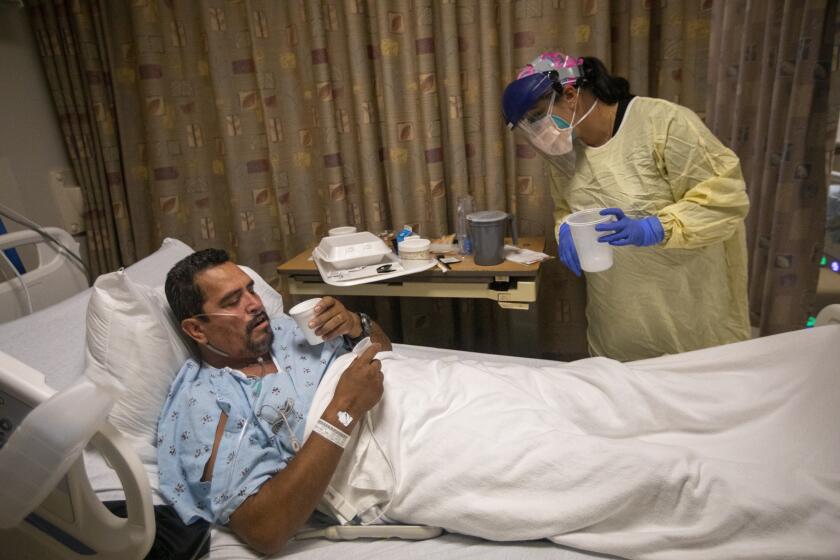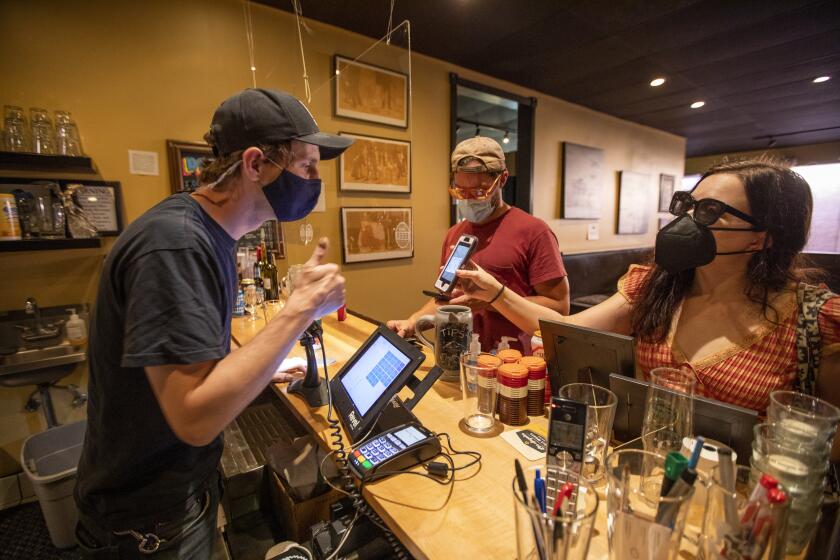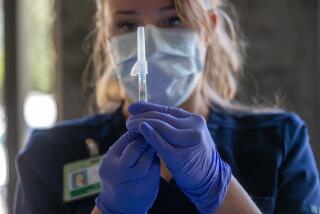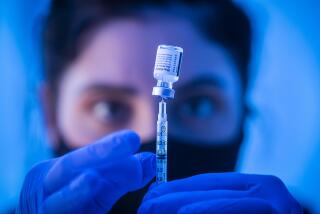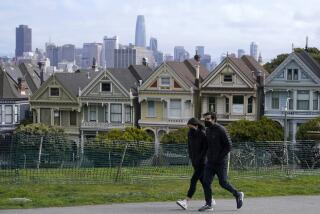San Francisco, ‘leading the way,’ requires vaccinations for many indoor activities
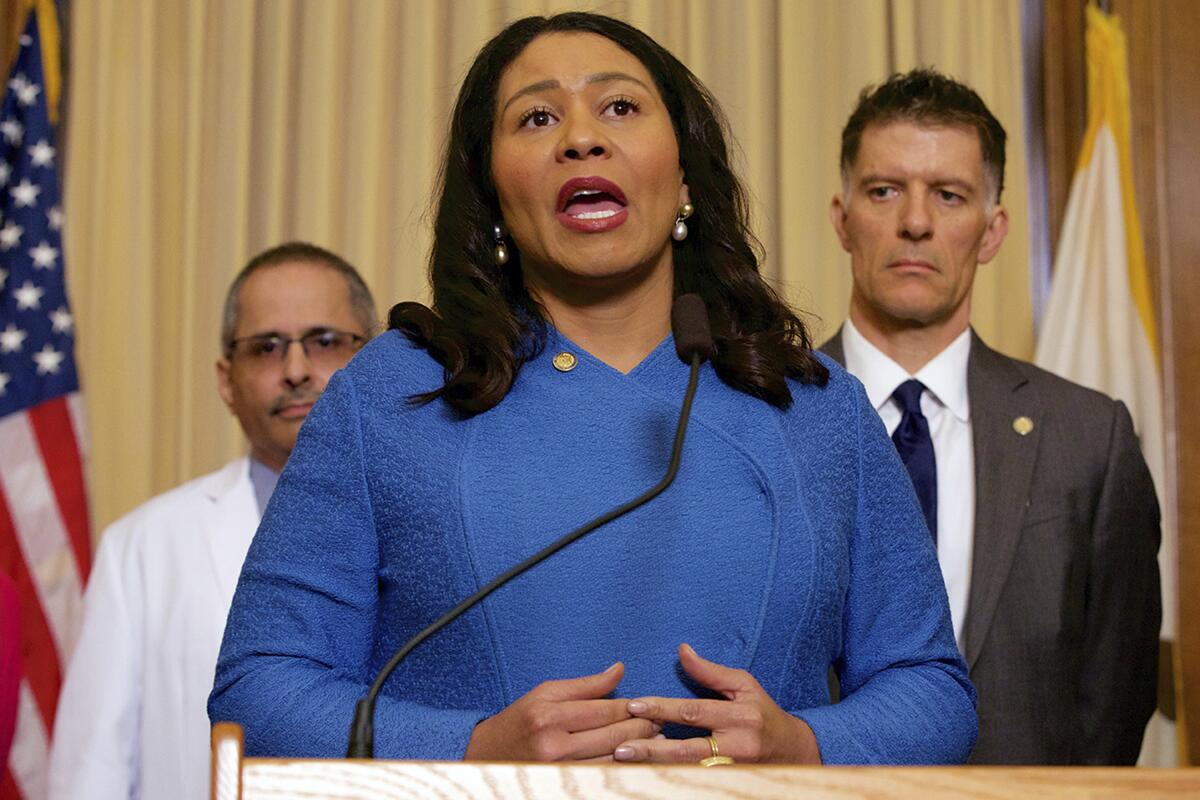
- Share via
SAN FRANCISCO — San Francisco will soon require patrons to show proof of complete vaccination against COVID-19 to enter gyms, restaurants, bars and other indoor venues, a step that puts the city at the forefront of municipal efforts to try to end the pandemic.
Other cities have announced requirements to limit indoor activities to people who have at least one dose of the vaccine or negative test results. San Francisco will require full vaccination, and negative tests will not suffice.
“San Francisco is really leading the way in public health interventions to keep people safe from COVID,” Dr. John Swartzberg, a UC Berkeley infectious disease expert, said after the city made its announcement Thursday.
Swartzberg predicted that more cities and counties will establish vaccine requirements once the Food and Drug Administration formally approves the Pfizer vaccine in the next few weeks.
“Right now we are seeing a crack in the dike, but I think the dike is going to completely open after FDA approval,” he said
San Francisco Mayor London Breed, who announced the new requirement at a news conference, said the city’s business community has been supportive.
“We know that for our city to bounce back from the pandemic and thrive, we need to use the best method we have to fight COVID-19, and that’s vaccines,” she said.
The city’s new health order requires both employees and customers of various indoor venues to show proof of vaccination — starting Aug. 20 for patrons and Oct. 13 for employees. Customers will not have to show vaccination proof if they are merely picking up to-go orders.
New York City later this month will require at least one dose of the vaccine to enter indoor locations, and the Los Angeles City Council on Wednesday called for an ordinance that would similarly require at least one dose to enter restaurants, bars, gyms, movie theaters and other venues. L.A. city lawyers are drafting a proposed ordinance that will eventually be voted on by the council.
San Francisco’s move comes after many restaurants and bars in the city began voluntarily asking patrons for proof of vaccination and reported a largely positive response from residents. The new mandate will affect people 12 and older — those now eligible to be vaccinated.
Nearly 80% of San Franciscans are fully vaccinated, but the new, highly contagious Delta variant is still causing havoc. The seven-day average of daily cases is 246, and the test positivity rate is 5.6%. During the winter peak of infection, daily cases averaged 373 and the positivity rate was 5.2%.
Vaccines have made a difference, however. On Aug. 8, 109 San Franciscans were hospitalized for COVID-19. During the winter surge, that number reached 265.
The city’s new health order will require vaccination for indoor events, both private and public, with 1,000 or more people. Exceptions will be made for people who purchased tickets before Aug. 12 for events occurring by Sept. 15. In those cases, people may show proof of a negative COVID-19 test instead of vaccination.
The order also extends vaccination requirements to workers at adult day centers, residential care facilities and dental offices and to home health aides and pharmacists.
Breed said she understood that the city’s health orders have created some inconvenience.
“But think about those people who have died, and count your blessings,” she said.
Dr. Grant Colfax, San Francisco’s health director, noted that COVID-19 “will be with us for the foreseeable future” and vaccinations will be key to keeping the city open.
“The vaccines are our armor,” he said. “They are our life jackets, our parachutes. They are our way out of his pandemic.”
Many bars in the city started demanding proof of vaccination from customers after some vaccinated employees contracted COVID-19. Though the vaccines protected the workers from serious illness, they still had to take off several days from work.
California’s coronavirus case rate remains significantly less than Florida and Texas: two common points of comparison given their population size and different pandemic responses.
“The bars did this a couple of weeks ago, and the city is following their lead,” Breed said.
Enforcement will not be heavy-handed, she said, and she anticipated businesses would comply with the new requirement.
“Many of the businesses welcome this,” she said.
She noted that some restaurants in San Francisco were even asking for vaccine verification for outdoor dining, which the city will not require.
Breed acknowledged that federal law exempts workers from vaccine requirements if they have a medical reason for not getting vaccinated or if they have a bona fide religious objection. Human resource departments will have to resolve such cases, she said.
Other California cities with vaccine requirements include Palm Springs and Cathedral City. Both will require proof of vaccination or a negative COVID-19 test result later this month to enter restaurants and bars.
The L.A. City Council has voted to direct city attorneys to draft a law requiring people to be at least partially vaccinated before heading to indoor sites.
California has done much better than many states in keeping the Delta variant in check and is now ahead of others on vaccine mandates.
The state has ordered that healthcare workers statewide must be fully vaccinated against COVID-19 come early fall, with limited exemptions allowed for medical or religious reasons. State and school employees will have to show proof they’ve been inoculated, with those who remain unvaccinated subject to a regular testing regimen.
Swartzberg said vaccines were being mandated both to encourage people to get vaccinated and to protect public safety. San Francisco’s requirement that patrons be fully vaccinated instead of having at least a single dose “makes a lot of sense,” he said.
“I would feel much safer in a restaurant knowing that everybody is fully vaccinated,” he said.
Times staff writers Emily Alpert Reyes and Luke Money contributed to this report.
More to Read
Sign up for Essential California
The most important California stories and recommendations in your inbox every morning.
You may occasionally receive promotional content from the Los Angeles Times.
